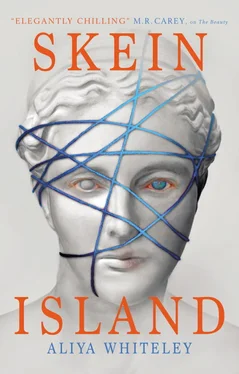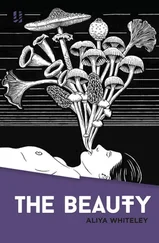‘Inger, would it bother you if I asked to keep that?’
‘Are you going to read it?’
‘Yes.’
‘Why? What do you think you’ll learn?’
‘I don’t know.’ I feel tempted to lie, to say I’m hoping to gain some sort of empathetic and wonderful insight into my mother’s choices, but I suspect Inger will see through such bullshit. So instead I tell her, ‘I already know why she abandoned me, and that she thought it was the right choice. I suppose I just want to own something that was personal to her. To feel I have a right to it. I already have her money and the island. Now I want a little bit of her voice.’
Inger considers this, and nods. ‘That makes sense,’ she says. She folds the paper once and gives it to me. ‘Do you want to read it now? Shall I give you some time?’
‘No, thanks. I’ll do it tonight.’
‘All right. Tonight.’
So we spend the rest of the day sorting through a history of bungalow allocations and staff holiday requests and coastguard reports, and I feel like I’m on the edge of a precipice, teetering, toeing the chalky, ragged drop into a cold, blue sea below.
* * *
The day is done; the night is here. How strange time has become to me. It is disjointed, unconnected to the slow sweeps of the hands of the clock. I could almost believe that I am not aging at all.
The dim light of Inger’s anglepoise is casting a circle over the sofa, where I lie in my sleeping bag, with my mother’s declaration in my hands.
Outside, all is calm, still and cloudless, the iciest of nights. In the morning all will be frozen, but in here the stove gives out glad heat and the spicy, warming smell of burning wood. Inger has gone to bed, and the moment has come.
I lift the declaration and read:
I’m not going to give her a second helping. She takes all of my time and energy as it is. Instead I’m going to keep this all to myself. It’s the story of how I came here, and why I stayed. My very own declaration. Not like the first one, when I came to the island for my week away from the world, and wrote about how my husband and my daughter failed to appreciate me. That was how I felt back then, no matter whether it was true or not. Doesn’t everyone fail to appreciate everyone, after all? But I had my predictable moans to get off my chest, and that’s what I did.
Predictability – that’s a terrible way to live. In all the years that have passed since my arrival, I never woke up knowing exactly what was going to happen.
Perhaps I always craved an element of danger, but I don’t remember being an adventurous child. I liked dolls and cuddly bears, and I kept all my toys throughout my teenage years, right into marriage. I only got rid of them once Marianne came along. I wanted everything that belonged to her to be brand new.
When I applied for Skein Island I never thought I’d get a place, so when the acceptance came through, I decided to go immediately, before my nerve deserted me. It was going to be my personal adventure, probably the only one I ever experienced. I was ready to have my week of self-discovery, and then return home forever more. But I’d be lying if I said I wasn’t hoping for something more than that. In retrospect, what was I expecting to happen? On an island in the Bristol Channel with no men, I harboured some overblown romantic fantasies. I think one involved a dashing pirate kidnapping me on the beach. Too much Daphne du Maurier is to blame for that. Of course, as soon as I saw the beach I realised how ridiculous that idea had been. Not only were there no pirates off the coast of North Devon, but the beach was a small patch of grey shingle strewn with smelly seaweed – hardly the golden stretch I had envisaged.
I remember checking into my bungalow. The décor was utilitarian, the other women uninteresting. The first two days of my holiday were spent taking part in macramé and yoga workshops. It didn’t occur to me to not attend the meditation sessions or the knitting circles, even though I hated them and still do now. I didn’t want to draw attention to my differences by refusing. The truth is, I’ve always imagined myself to be less of a woman for not liking such things, and I’ve never wanted anyone else to find out.
This is a strange thing to admit. I’ve been denying it to myself for years, but I’m just not fond of the company of women. Ironic, I know. When I was younger I thought maybe I hadn’t met any of the right sort of women yet, and that one day I would find a whole pack of them, just like me. I hoped they would turn up on Skein Island. But now, after years of waiting, I’ve begun to accept that all women are the same. I include myself. Didn’t I simply go along with the herd? Didn’t I make the choices that were easiest for me? When did I ever stand up and say, actually I don’t give a flying fuck about yoga or manicures? I only ever thought it. There must be millions of us thinking it. But we never act on it, do we? We never take over the magazines or shoot the fashion designers. We’re all too goddamn good for an actual war.
I’ve only ever met one woman who took on the world, and that was Amelia Worthington.
I met her on my third night on the island, and was enthralled by her. We all were. By sheer luck I’d been given the seat next to her at dinner in the white house. She was elegant and loquacious, charming enough to accept my gushing speeches of adoration with good grace. At the end of the meal she offered to give me a personal tour of the house, and took me around the upper floor, where the artefacts were kept. It was an exhibition of pieces she had rescued from around the world: Egypt, Greece, Turkey. ‘Rescued’ was the term she chose to describe them. Others were not so keen on her euphemism. When I became her personal assistant, just two days later, the first task she allocated to me was the answering of letters from collectors and curators, often demanding that she release details of her hoard and return those that she had stolen. I responded politely. It was never going to happen, of course; she had so many powerful admirers, celebrities and politicians who kept her safe. It was a protected, cosseted life by then, but she had earned it. At least, that was what I thought back then. I saw her as a woman who stood alone, fighting the establishment, carving out a haven for all women. I didn’t find out the truth until six months later.
So I took the job under the illusion that I’d be doing some real good, I suppose. But it was more than that. A seduction took place. Amelia told me that she needed me, that nobody else could do the job, and I wanted so badly to believe her. Years later, towards the end, I asked her what she had seen in me that hadn’t been present in all the other women who stayed on Skein Island. She said, ‘Nothing, my dear. I picked you at random.’ That’s a difficult thing to accept. Like winning the lottery or surviving a concentration camp, it’s these things that happen out of the blue, without any logical explanation, that never make sense to us, that puzzle us to the end. The guilt of such luck is enormous. But Amelia always liked to tell stories, right until the very end, so I like to imagine that just wasn’t true. Maybe she said it just to shut me up, so she could get on with her nap. I wouldn’t put it past her. No, she must have seen something special in me. My tenacity, my ability to do the worst jobs, make the tough decisions. My gullibility.
That first time, when she took me down into the basement and introduced me to the statue, I didn’t dare to question her story. I never have. Of course, the business was up and running by then, and my role within it was laid out for me. I had to change the barrels once a day. That was my first duty. They had become too heavy for Amelia.
Читать дальше












